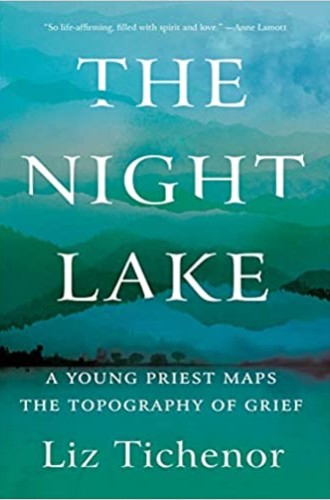Liz Tichenor’s life in the wake of her infant’s death
We are called to accompany the bodies we love from birth to death and beyond.
In many ways this memoir is deceptively straightforward. On January 9, 2014, Liz Tichenor’s 40-day-old son, Fritz, died suddenly. The book begins with Fritz’s death and then moves steadily through the four years afterward, interspersing Tichenor’s tentative steps toward healing with memories of the death of her mother by suicide only a year and a half earlier. The book is broken up into 11 chapters, each with its own series of subsections and titles. It is not fragmented or experimental, nor does Tichenor flood it with references to outside authorities on grief or theology. The Night Lake is a memoir written as it was lived—in measured, small steps forward.
This form is a wise and salient choice. In her essay “The Joni Mitchell Problem,” Meghan Daum discusses an issue many memoirists face: the inability to discern between “letting it all hang out” and “putting yourself out there.” Letting it all hang out is the tempting (and sometimes lauded) practice of offering the reader “indiscriminate and frequently gratuitous” detail, pushing raw experience without any real effort to shape or manage it. Putting yourself out there, on the other hand, is the use of one’s own experience in service to a reader: it is “not foisting a confession” but rather using the personal to invite the audience to contemplate the universal.
Read our latest issue or browse back issues.
Initially, The Night Lake might feel like a memoir that lets it all hang out. Tichenor is resolute in her insistence on providing a detailed narrative of Fritz’s death and her mother’s suicide, and not just of these losses themselves but of the absurd practicalities that accompanied them. She writes about the coroner who visits her home and accusingly tests the buoyancy of her mattress; she writes about receiving hand-me-down clothes in the mail just after Fritz’s death. She writes about scrambling minutes before the funeral to find a box to house his ashes, about the relentless flood of milk in her breasts, about the cost of burying a child, about verifying the numbers on the cremation tag, about arguing with insurance companies about whether a maternity leave is valid if the baby is dead.
But before long, it becomes abundantly clear that Tichenor’s accretion of these details is not about letting it all hang out. Rather, it is a purposeful and artistic offering of what it means to live in the wake of death—and an invitation to those of us who, in response to hearing tragic news, have uttered the empty phrase “I cannot imagine.” As Tichenor observes toward the end of the book, the truth is never that we cannot imagine; the truth is that we desperately do not want to.
Fritz’s death and the immediate aftermath take up only the first 50 pages or so of the book; the rest moves between memories of Tichenor’s fraught relationship with her alcoholic mother and Tichenor’s uneven path toward healing. Outwardly, she makes many healthy choices: she leans on friends and mentors and a therapist, she takes a dream job and moves with her husband and three-year-old daughter back to a familiar and loving church community in Berkeley, she devotes herself to running, she becomes pregnant and births a healthy baby boy, she wrestles with the vestiges of her mother’s alcoholism within herself and eventually chooses sobriety.
But inwardly, Tichenor’s healing does not always progress predictably. Fear is persistent, and the grief is not always manageable. This tension that Tichenor must learn to accept in the very cells of her being—between loss and life, death and resurrection—is one of the difficult truths at the center of the memoir.
It is not until the final pages of the book, at an Easter Vigil service, as the congregation sings, “Within our darkest night you kindle the fire that never dies away, that never dies away,” that Tichenor finally asks herself: “How much did I believe this?” Indeed, from the first pages of the memoir, this question has hovered for readers but gone unasked by Tichenor. How, we are so eager to know, is belief in God possible after this kind of loss?
Tichenor offers multiple ways to answer this question, all embedded within the narrative itself. I found two of them to be particularly profound.
The first comes when Tichenor preaches for the first time after Fritz’s death. The lectionary readings are absurd given her current situation, and when she flips to the assigned psalm she finds that it is the 23rd. “Though I walk through the valley of the shadow of death, I shall fear no evil.” Tichenor is beside herself. “I choked on the words, awkwardly spitting them out. I feared everything right now.” But after mulling the verse over a bit more, she realizes that the verse is “not descriptive, but aspirational” and that in speaking these words she “could try to choose not-fear as a way to see promise even within the darkness, even when no way forward was yet evident.” She chooses to say the words, to preach the words, not because she is able to believe them at that moment but because she has faith enough to hope “that maybe I could speak it into being for myself.”
The second way Tichenor responds to her own question about belief is through the words of her mentor, a priest named Phil. When Tichenor asks whether he will come with her to pick up Fritz’s ashes from the funeral home, he says that of course he will: “It is the priest’s job to accompany the body. This is our job, Liz. You will not do that alone.” Indeed, the call to accompany the body follows Tichenor throughout the book: as she lays Fritz’s ashes in the ground, as she reads the details of her mother’s autopsy report, as she pushes a new child into being.
Although Phil is talking about the vocation of a priest, he is also talking about the vocation of a Christian: we are called to accompany the bodies of those we love, from birth to death and beyond. Just as saying the words of scripture might be aspirational until we can find our way back into belief, Tichenor suggests that so also might Christian practices—the sacred work of doing—coax our bodies forward until our hearts can catch up.
I was wary of picking up this book, worried that reading it might make me feel like a rubbernecker, slowing the car to a crawl for a sight of a horrible accident. Memoirs that let it all hang out have that effect on us; lurid details titillate us and then comfort us with distance. This is not my horrible tragedy, they remind us, this is not my story.
But Tichenor’s second son, Sam, is not so clear about these sorts of distinctions. At the end of the memoir, he gets confused during a children’s sermon and mixes up the stories of Jesus and Fritz. Initially appalled, Tichenor ultimately admits that Sam is right: “This story is who I am. It is Jesus’ story and Fritz’s.”
The generosity of Tichenor’s writing and her faith remind us that her story is our story, too. If we are Christians, we choose to accompany the body. Reading this book is a sacred chance to accompany hers.







